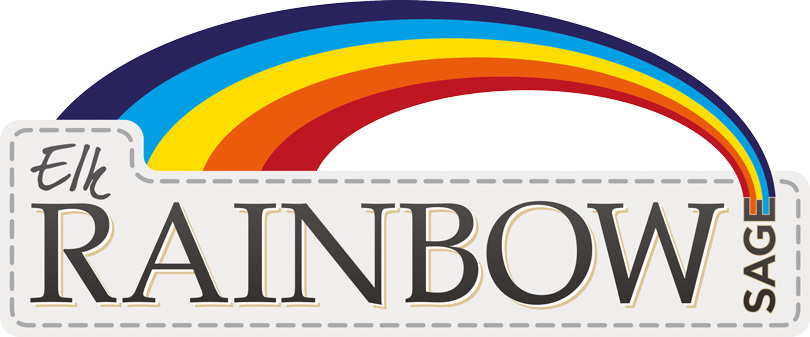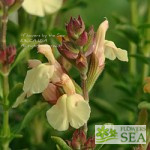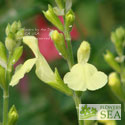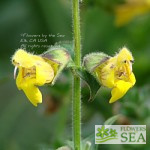
Development of Jame Sage (Salvia x jamensis) hybrids is rapidly expanding to contain a broad range of flower colors from soft pastels to brighter, more intense colors that are closer to the primary and secondary ranges. An example is our new series of Jame Sages called Elk Rainbow Sages, which range from pale pastels to brights and bicolors depending on what Salvias crossed to create these hybrids.
However, one unerring distinction between Jame Sages and other hybrid Salvias is that, whatever sages are in the S. x jamensis mix, both Autumn Sage (Salvia greggii) and Mountain Sage (Salvia microphylla) parentage is always involved. These species are native to the American Southwest and Mexico. The first ones collected were found as a genetic swarm near the tiny Mexican village of Jame (no s), located in Central Mexico where the eastern and western Sierra Madre mountains meet.
Colors and Other Characteristics
Flowers by the Sea is developing numerous varieties of Jame Sage, in solids and bicolors, for ongoing introduction as part of the Elk Rainbow Series. These include a wide range of soft and bright blues, reds and yellows as well as secondary colors, such as oranges and purples.
The unusual flower colors -- including many pastels and bicolors -- of these sages are a major key to their identification. Also, similar to Autumn and Mountain Sage, the flowers of Jame Sage have a wide, skirt-like lower lip.
However, other characteristics of appearance also require consideration. Although the foliage of Autumn and Mountain Sage vary somewhat in size and appearance, they are good clues when determining the parentage of many Jame Sages. However, some of these hybrids have foliage of different sizes, textures and colors (gray to deep green) than Autumn and Mountain Sage. The lineage of Jame Sage may include species such as Coahuila Sage ( S. coehuilensis), Mexican Sage (S. darcyi) and Canyon Sage (S. lycioides). It may also include crosses with hybrids, of which there are so many combinations that we can't detail them here.
But the broad height range of Jame Sage -- from 12 to 48 inches -- differs from both these species. Some shorter varieties of Elk Rainbow Sages show promise as groundcovers due to their matting growth.
Cultural Traits and Appeal to Wildlife
A sage's habit of growth -- such as its cultivation needs and bloom season -- also help to identify it as Jame Sage versus another kind of Salvia hybrid. For example, Jame Sage hybrids are heat and drought tolerant as are Autumn and Mountain Sage. These hybrids love full sun similar to Autumn Sage. But like Mountain Sage, they tolerate more shade and moisture than Autumn Sage. As with the two central parent species, Jame Sage blooms from spring into fall and may slow down in the deep heat of summer.
Jame Sage hybrids also match Autumn and Mountain Sage in drawing honeybees, hummingbirds and occasionally butterflies.
Plant Adaptability and Guarantee of Quality
We developed all of the Elk Rainbow Series at our farm on the Northern California coast near the town of Elk where Jame Sage grows beautifully. This ability to thrive in a relatively cool, often moist coastal climate versus the semi-arid mountain homelands of these hybrids says a lot about the adaptability of Jame Sages.
Each Jame Sage hybrid that we select for development has Elk in its name. That way you know it is an FBTS cultivar and that it is a reliable repeat performer.




